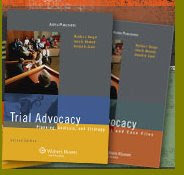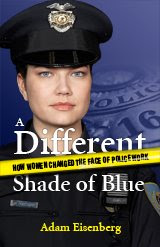
Three faculty members from Seattle University have written a second edition of their trial advocacy textbook: Marilyn J. Berger, John B. Mitchell & Ronald H. Clark, Trial Advocacy: Planning, Analysis, and Strategy. Its companion book is Trial Advocacy: Assignments and Case Files.
The publisher's description of the book begins:
Trial Advocacy: Planning, Analysis and Strategy, Second Edition is completely revised and updated reflecting today’s trial practice. Every chapter includes practical and conceptual instructions with realistic illustrations. Trial planning techniques and strategies using case theory and theme are explained in depth. Trial Advocacy presents premier trial persuasion principles and state-of-the-art technology used by practicing lawyers. It provides guidance for every phase from trial preparation to closing argument. The text together with an accompanying DVD showing model trial demonstrations of all aspects of trial from jury selection to closing argument, make this this an outstanding primer for law students and will serve as an indispensable resource for a continuing trial practice. A companion book contains Assignments and a CD with the case files.
The first edition came out in 1989, so an update is very welcome -- particularly with respect to technology used in practice management and trial presentations.
Throughout the book, students will find handy tips and checklists set off in boxes -- helpful reminders to people who are trying to develop their skills.
The supplement has dozens of exercises that can be used in a class or training session. It comes with a CD that has lots of documents connected with the exercises (pleadings, deposition excerpts, experts' CVs, photographs, etc.).
I like the "research memoranda" -- short discussions of the law in the fictitious jurisdiction where the exercises are set, so that students have the relevant rules of evidence and a summary of caselaw on issues like spousal privilege, prior convictions, duty to defend, or whatever. The preface says that faculty can choose to set the exercises in their own state and have students research the law. I'm all for more research experience for students, but I see an advantage to giving the students the law so that they can focus on the skill and judgment needed for making objections, arguing motions, and so on.
But wait, there's more!Trial advocacy doesn't take place within the covers of a book, you know. Recognizing that, the authors provide a DVD so that you can see and hear a demonstration trial (or significant passages from a trial). You can see clips
here.

Seattle lawyers and law students might recognize several of the actors. Lawyers are played by local lawyers -- and UW and SU Trial Ad instructors --
Lisa Marchese,
Craig Sims,
William Bailey (pictured above),
Vonda Sargent, and
Matthew Williams. The judge is played by Judge Dean S. Lum of King County Superior Court. The defendant is played by Tacoma District Court Judge
Jack Nevin. Not only can you spot folks you know -- the fact that real lawyers are involved makes the mock trial very realistic. The script is by Ron Clark -- no slouch either, of course!
Just a week or two ago, a lawyer called me looking for DVDs of trials that he could watch to learn more about trial procedure and presentation skills. We talked about going to the courthouse to watch actual trials -- he agreed that that would be useful, but he felt he couldn't take the time from work and he could watch a DVD in the evening. He wanted actual trials, but this carefully edited DVD might be a much better start.
The DVD also includes a tour of the crime scene from another case, with the prosecutor's investigator walking the viewer around, showing where the witnesses were sitting, where the hallway was, and so on. This should be very helpful to students trying to prepare trial exercises for that case. Hats off to Seattle U's
Films for Justice Institute, which did a fine job creating the films.
Two books, a CD, and a DVD. What else could you want? Well, there's a
website with some additional information, including
links to companies that prepare trial graphics, research sites, and other sites (including this blog).
Disclosing possible bias, I'll say that I've chatted with Ron Clark at the Book Store Cafe and I was happy to get review copies of the books in exchange for a promise to blog about them.
Those review copies will soon be part of the library collection so UW students and others in the Seattle area will be able to take a look. When they've been cataloged, I'll add the call numbers here.









